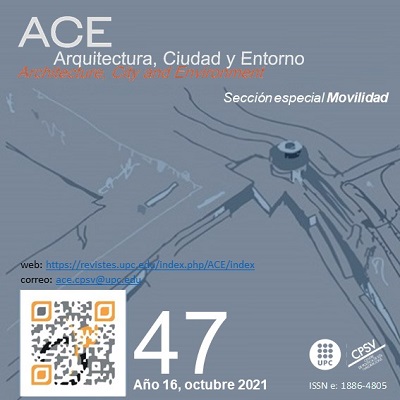Public Space and Mass Transportation: Uses and Perceptions. Paseo Alcalde and Line 3 SITEUR in the Metropolitan Area of Guadalajara, México
DOI:
https://doi.org/10.5821/ace.16.47.9631Keywords:
Social appropriation, public transport, historic centreAbstract
The research interest that gives rise to this article centers on analyzing the relationship between mobility infrastructures and the public space generated to potentiate intermodal movements, a relationship that transcends its utilitarian sense and is established as a process of social, economic and environmental transformation of urban environments. The particular objective is focused on analyzing the uses and perceptions that take place on the recently inaugurated public space "Paseo Fray Antonio Alcalde" located in the first square of the Historic Center of the city of Guadalajara, Mexico. Transformed space that presents new socio-spatial qualities derived from its close link with the construction of line 3 of the Urban Electric Train System (SITEUR), a metropolitan impact mobility infrastructure. Inherent in any proposal that involves the transformation of a historic center is the dialogue between antagonistic positions, between those who advocate recovering Essences and those who envision future progressives with new codes, among them the urban population that uses, lives and transforms said spaces from their daily practices, they are given a voice in the present approach. The methodology used linked the historical analysis with a perceptual analysis exercise based on semi-structured interviews and non-participant observation in the study area. Derived from this, the predominant perception labels the project as "gained ground", referring to the still vivid memories of past representations, however, establishing critical visions of the existence and clear demands to assert the common interest over private interests.
Downloads
Published
Issue
Section
License
| INTELECTUAL PROTECTION CRITERIA |
At this moment, it is count with the "Oficina Española de Patentes y Marcas", while global protection it is being processed by the World Intelectual Property Organization (OMPI/WIPO). Nevertheless the International Standard Serial Number Office (ISSN) has given the following numbers ISSN: 1886-4805 (electronic version) and 1887-7052 (paper version). All articles will be peer reviewed, using double blind reviewing. |
| COPYRIGHT |
The article contents and their comments are authors exclusive liability, and do not reflect necessarily the journal editor commitee's opinion. All ACE published works are subject to the following licence CC BY-NC-ND 3.0 ES http://creativecommons.org/licenses/by-nc-nd/3.0/es/ It implies that authors do not hold nor retain the copyright without restrictions but only those included in the licence. |





































